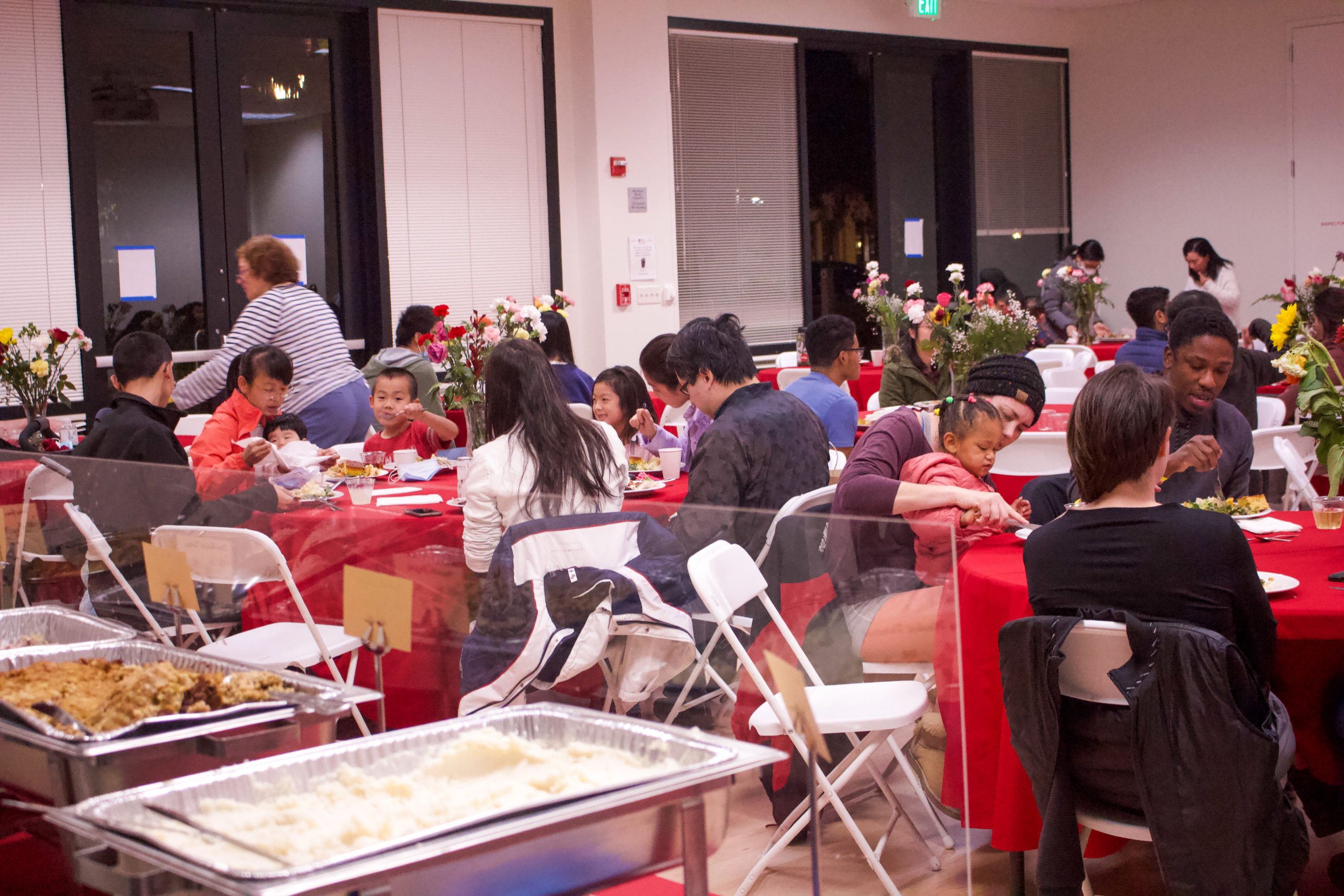To a passerby walking through Escondido Village this Thanksgiving, campus may have looked relatively normal, save for the lack of students frantically biking to and from classes. But inside a tent on Kennedy Commons, between plates of turkey and mashed potatoes, friends and families were doing something they have waited two years for: celebrating together.
Each year, the Graduate Student Council (GSC) hosts a Thanksgiving dinner for graduate students and their families to join friends in relishing the festive spirit before the end of fall quarter. Approximately 1,600 graduate and undergraduate students stopped by Kennedy Commons this year for a traditional Thanksgiving meal catered by Ray’s Grill, according to GSC co-chair K.C. Shah J.D. ’22.
Amid COVID-19 restrictions and cautionary messaging from the University regarding Thanksgiving travel, many graduate students chose to stay on campus for the holidays. This holiday season marks a time of unity and recuperation for many of Stanford’s graduate students, especially as festivities continue to be upended by the pandemic.
This year’s in-person Thanksgiving dinner was the first time graduate students on campus celebrated as a community in over two years — the GSC opted for a dinner pick-up in 2020 due to social distancing protocols. Shah, who organized the event, said it was a welcome opportunity to support students, especially those who may not have been able to return home for financial or logistical reasons.
“We don’t do it for the thank you,” Shah said. “We just do it because it’s an important part of our community. I think it just shows how the Thanksgiving spirit about being grateful is definitely present at this meal. It’s a normal, wonderful Thanksgiving dinner, just like you might find in a movie or TV show. Or at home.”
The event would not have been possible without the support of the University, which offered $130,000 in funding for the event to support food and labor expenses, according to Shah.
“The fact that the Provost is giving money shows how much she cares and believes that Thanksgiving is an important part in a year that so many members of our graduate community have faced tragedy and loss of family members,” Shah said. “It’s really important to just be thankful for everything that we have.”
Ray Klein, the owner and operator of Treehouse, the Coffee House and Ray’s Grill, helped facilitate the Thanksgiving dinner, which also featured flower bouquets made on campus and other table decorations. Klein said that he and the organizers tried to make the event “warm and fuzzy” for attendees in light of pandemic-related financial and mental strains.
“I’m 84 years old and this is what I would want for my kids,” Klein said. “I am very much involved in taking care of the community. The community is taking care of me by giving me a business and I like giving back. I think that everything we do shows that.”
For students who are planning to celebrate other cultural holidays in the coming months, support from the Stanford community can go a long way.
Yiqing Ding, a sixth-year mechanical engineering Ph.D. student and international student from China, said he will stay on campus throughout the holiday season and hopes to spend Chinese New Year, which falls on Feb. 1, with his friends at Stanford. Chinese cultural campus groups will hold events to commemorate the holiday, including by hosting performances at the Memorial Auditorium.
“For me, it’s taking a break from work because my friends and me, we’re full time students,” Ding said. “A lot of them, I probably wouldn’t see during holiday time because we’re just so busy. But during the holiday, we can take a break. It’s a value for us to meet up and reunite.”
Last year, Ding left Stanford for China amid COVID-19 concerns and was unable to celebrate Chinese New Year with his colleagues and classmates in-person. Since returning to campus in October, Ding said he has seen the power of holidays to help foster community bonding on campus and give graduate students another space to call home amid travel restrictions.
“It’s a time for us to celebrate and reunite again,” Ding said. “A lot of us haven’t seen each other for a long time. Through this event, it’s [a] time for us to recognize our culture.”
